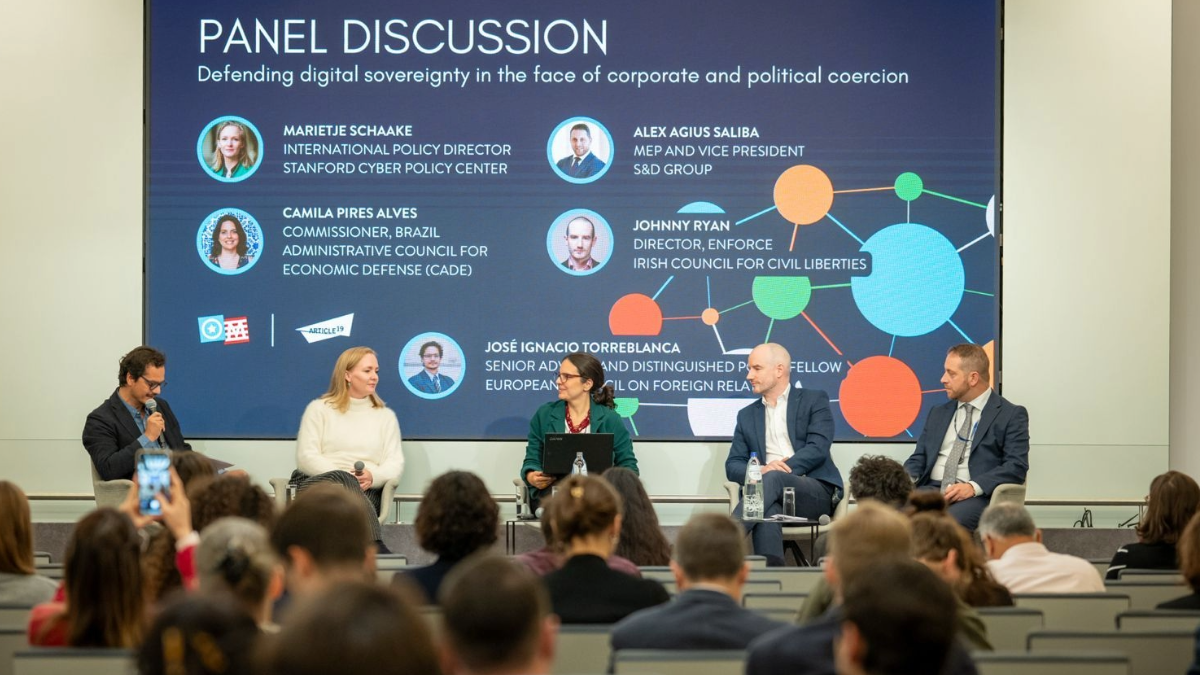What Europe Needs to Lead the Fight for Democracy
Ramsha Jahangir / Oct 16, 2025Starting today, Tech Policy Press will publish perspectives from key voices in Europe as part of an Ideas for Europe’s Future series.

Panelists discuss threats to Europe's digital sovereignty during the Open Markets Institute and ARTICLE 19 conference in Brussels on October 15, 2025. Source: Article 19
Europe has laid down some of the world’s most ambitious digital rules, including the Digital Services Act (DSA), the Digital Markets Act (DMA), and the General Data Protection Regulation (GDPR). Yet, as civil liberties campaigner Johnny Ryan said at a high-level Brussels conference co-organized by the Open Markets Institute and Article 19 this week, “The question of the moment is whether Europe is going to be strong and independent or whether it is going to be a vassal.”
The laws are in place. But the EU’s leverage is limited. Despite repeated calls, the bloc still can’t fully use its anti-coercion instrument – a tool designed to protect European companies and markets from economic pressure or retaliatory measures by third countries – to counter pressure from the United States. At the same time, enforcement actions are limited, including (the lack of) a major DSA fine against X.
Across panels, voices from the EU Commissioner for Democracy, Justice, the Rule of Law and Consumer Protection, Michael McGrath, former European Commission Executive Vice-President for Competition, Margrethe Vestager, to former Prime Minister of Italy Mario Monti, to German MEP Alexandra Geese stressed that legislation alone isn’t enough and Europe must act boldly to protect democratic principles and confront the concentration of digital power.
In her keynote address, Margrethe Vestager framed enforcement as an act of democratic integrity. “Enforcing laws is keeping the promises you gave,” she said. Vestager warned that the greatest threat to democracy today is not technology itself but the concentration of digital power in the hands of a few dominant platforms. Competition policy, she argued, is not only an economic instrument but also a democratic safeguard, keeping markets open, preventing abuse, and protecting plurality.
Vestager called for continued enforcement of the GDPR, DMA, and DSA, describing them as Europe’s framework for ensuring that digital products are fair, transparent, and accountable. Referring to the ongoing Google AdTech case, she observed that “if regulators had banned conflicts of interest 25 years ago, we would be in a different world—and it’s going to get worse with AI.”
Commissioner McGrath framed the discussion in the broader context of defending democracy itself. He warned that freedoms in Europe are not guaranteed but must be actively protected daily, noting that disinformation, cyberattacks, and attempts to undermine the rule of law threaten democratic institutions.“Being a free citizen, a European citizen, means having the space to speak, debate, challenge, and engage in politics without fear,” he said, adding that these freedoms are “the lines of our sovereignty and our security.”
The challenge facing Europe is immediate and complex. European governments remain dependent on US-based cloud infrastructure and AI technologies, leaving the continent exposed to both political influence and potential sanctions. Abroad, the stakes are high because US tech firms and the Trump administration have labeled European rules “Orwellian,” accused the bloc of censorship, and threatened tariffs in retaliation.
MEP Alexandra Geese urged that debates around free speech should be “authentic and not defensive,” while former UN Special Rapporteur on the Promotion and Protection of the Right to Freedom of Opinion and Expression, David Kaye, argued that Europe needs “an offense, a strategy, instead of just responding to attacks.”
Stanford scholar and former MEP Marietje Schaake captured the urgency of the moment, calling on the Commission and member states to leave “nostalgia for another day” and seize the opportunity for digital sovereignty. “This dependency [on US technology companies] was undesirable economically, but now it is also a threat to national security.”
Maltese MEP Alex Agius Saliba added that Europe’s regulatory actions so far, including DMA investigations and enforcement, are steps in the right direction, but warned that the legislation alone is not enough. He cautioned against bending legislation to appease US interests, saying that simplifying rules for the sake of US Big Tech firms “will destroy our ability to enforce our own rules.”
Exacerbating the problem is AI’s unchecked dominance. As venture capitalist Roger McNamee warned, “Big Tech knows they're stoking a bubble that will end in a crash. They are not concerned. The crash will wipe out smaller rivals and weaken the governments that they want to control.”
David Kaye added, “The entire information environment is increasingly influenced not just by monopolistic platforms but also by the seemingly do-no-wrong AI industry that governments are cheerleading. They’re rolling out product after product without considering any risk assessments on its impact.”
Jonathan Kanter, a former Biden administration antitrust enforcer, offered a complementary perspective, warning that concentration of corporate and political power is not just an economic problem but a threat to democracy itself. “Plutocracy is its own form of dictatorship,” he said, emphasizing that unchecked corporate consolidation can undermine media independence, distort information flows, and weaken citizens’ ability to hold power to account. “There is no such thing as a benevolent dictator. There is no such thing as a benevolent monopolist,” he said. Kanter urged regulators to act decisively: even when the scale of the problem is overwhelming, “do something. Do not let the enormity of the problem paralyze action.”
Introducing the Ideas for Europe series
The conference made clear that Europe’s challenge is not creating rules, but asserting them, even in the face of US pressure and powerful market interests. But what will it take to turn resolve into action?
Starting today, Tech Policy Press will publish perspectives from leading experts who participated in the conference as part of the Ideas for Europe’s Future series. Over the next week, the series will tackle pressing questions, including:
- What’s needed for Europe to enforce its tech laws?
- Can independent digital infrastructure protect European democracy?
- Are Europe’s values a competitive advantage or a self-imposed limitation?
- Building European infrastructure: what does Europe need, and what can it realistically achieve?
- Europe wrote the AI rulebook, but can it deliver on its ambitions?
Check the site for updates; links to the pieces will be placed here as they are published.
- Are Europe’s Values a Competitive Advantage or a Self-Imposed Limitation?
- Building Digital Sovereignty: What Does Europe Need and How to Achieve It
- Europe Can’t Defend Democracy on US Servers
- How Europe Can Expand Digital Trade to Challenge Big Tech’s Anti-Regulatory Push
- Why Europe’s Resistance to Big Tech Matters for the Future of Democracy
- Civil Society is the Democracy Shield Europe Can’t Ignore
- Europe Isn’t Weak—It Just Pretends To Be. Here’s How to Fix That.
- Europe Wrote the AI Rulebook. Can it Deliver on its Ambitions?
Authors
